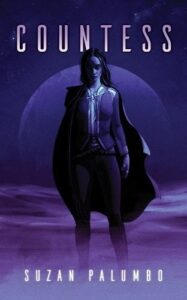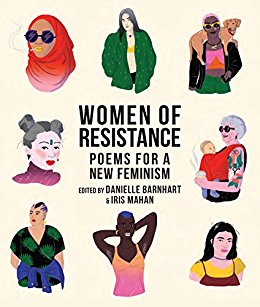This review contains spoilers.
Countess by Suzan Palumbo is a short science fiction novel that is a love story to the West Indies and its people even lightyears and generations away from the islands of Earth. It follows Virika Sameroo, a soldier for the Æcerbot Empire that controls and subjugates people like Virika just as the British did to her ancestors. She gives everything that she is to the empire, throwing her passion for art to the side after her father dies and leaves Virika and her mother with a lack of options. Virika works harder than any of the people born into the Empire, and she becomes a lieutenant onboard the Oestra. When the Captain gets sick, Virika becomes acting captain and commands the ship back home. Once there, however, the captain’s condition worsens, and Virika is blamed for his death. After finding herself sent to the Pit, an isolated prison on an isolated planet, Virika has to confront the truth: that the empire never cared for her, no matter how much of herself she gave to it. Virika’s world grows larger after a guard helps her escape, and Virika becomes determined to help her people fight against the empire that tries to squash them under its thumb.
Something Palumbo does a wonderful job of is planting the seeds for things that sprout in the future. Virika meets an old woman who calls herself the Baroness, and it was immensely satisfying when Virika became the Countess later in the book in response to this. Virika’s girlfriend at the time of her trial, Alba, keeps Virika going when she finds herself in the Pit, and I kept waiting for Virika to learn something about Alba’s involvement in her incarceration. I was not left disappointed: she finally found out at the end of the novel. Foreshadowing is Palumbo’s strong suit, and every plot thread and hint became relevant at some point in the story. It was a delight to watch as everything fell into place.
Palumbo’s world is also so vivid. Virika’s culture is very important to who she is and who she becomes. Even the food that her mother cooks for her stands in stark contrast to the food that the empire feeds her in the Pit. It is through a guard sneaking her fruit she misses from her culture that she makes her first real ally and is subsequently able to flee the prison to become the Countess who brings the empire to its knees. I could feel the care crafted into this narrative every step of the way. Where other stories have fallen flat, Countess stays deeply rooted in who Virika is and who she finds connection with. The longer Virika spends outside of the empire’s field of vision, the more Antillean she becomes. She spent so long before the story takes place sanitizing herself to be whatever the empire wanted her to be, and it’s so satisfying to be able to read along as she rediscovers who she is and who she should give her loyalty to. Virika has the empire’s accent, but when people like her mother speak with the accent of their people, Palumbo changes how the words are spelled and the way the sentences are structured so that the reader can see how much the empire has taken from Virika. Normally, I’m not a fan of language being written phonetically in a novel, but it felt extremely important in Countess to see that the empire has taken away even the accent of Virika’s people from her. Palumbo did a wonderful job of it.
The romance in this story is also top-notch. Virika is unapologetically queer. When she is asked why she gave a coin to Alba that implicated her in the murder of the captain, she confesses to a council of empirical officials that she gave the coin to her because she is in love with her. Later, when Virika meets the guard, Kalima, who helps her escape, there is a simmering tension that goes unaddressed but that had me relishing every interaction they had. Virika then falls in love with Dominique, the cook onboard the ship that rescues Virika during her escape, and their relationship grows and grows as the rest of the story unfolds. By the time Virika and Alba run into each other again, Virika is firmly in a relationship with Dominique, and Virika has to deal with her love for both women surfacing. Virika never shies away from who she is attracted to, and I loved that about her.
The only real critique I have of the novel is that I wish it was so much longer. Coming in at only 162 pages, there isn’t space for lingering on anything or in explaining some of Virika’s outside relationships when they stop being pertinent forty pages in. In the first chapter, Virika says that Captain Whitehall is like a surrogate father to her, but we don’t see a single bit of that, not even in flashback. We only know that they are close because Virika tells us that they are close, and the only interaction they really have results in the captain calling her a slur and yelling at her in feverish delirium. Her relationship with Alba also isn’t described in much detail; she becomes relevant again later in the story, but Virika is too far out of that past relationship for anything other than her longing to be reflected on the page. This book could have been four hundred pages, easy. I love it so much, but there were times when it felt like I was reading someone else’s summary of the book instead of the book itself, particularly at the end. I can see in my head the rolling space opera that this could have been, and I wish that it was a reality. There is so much more to this story than what is actually told on the page. Decades pass by with barely a mention. Virika grows from a simpering pawn of the empire that mistreats her people to the leader of a rebellion that failed once in the past, and I wish that we could have seen these changes take place more gradually and see Virika’s reflection on it all in much greater detail.
I enjoyed this story so much. When I opened it and dove back into something very decidedly science fiction, I felt my spine unlock. I read this in one sitting; I could barely put it down to do anything else. Palumbo does such a wonderful job at telling a story about colonialism inside the vast expanse of space, and I am looking forward to reading whatever she writes next.
Trigger warnings for: death, self-harm, threat of sexual assault, and desecration of a dead body.




